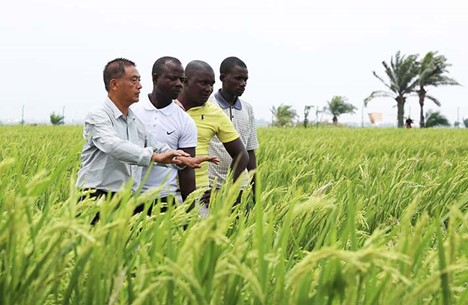Complementarity Gains. Russia and China can provide Africa what it needs
In
Log in if you are already registered
Changes not seen in a hundred years are taking place - and the global South stands to benefit. Africa is the world’s youngest continent and its many nations are developing rapidly.
Investment that reinforces local agency and solidifies development gains is the missing piece of the puzzle. Russia and China have been delivering this independently of each other.

A Chinese rice expert instructs local farmers in a hybrid rice field in Kihanga, Bubanza Province, Burundi, on 29 October 2022 (XINHUA)
Recently, Russia and China promulgated strategic roadmaps that are mutually reinforcing. This overlap will be a boon for Africa. The compatibility of China’s Global Civilisation Initiative and Russia’s Foreign Policy Concept is broadly split into three aspects - multipolarity, values and infrastructure.
Cooperation with Africa must give it more agency. Multipolarity will be key in achieving this. China emphasises principled opposition to hegemony. These approach set African states on an equal footing with their Eastern partners.
Russia explicitly states its objective of supporting “African solutions for African problems,” while China’s initiatives also emphasise the importance of community autonomy in seeking solutions to local issues.
African societies are deeply traditional. Governments follow their people in taking a principled stance on values, especially when it comes to family. African societies have long histories of spirituality. Ethiopia, for example, boasts a rich Orthodox tradition hailing from the fourth century. Tradition and spirituality permeate African societies.
Western values are rapidly diverging from African societies. Simultaneously, the West is intertwining its progressive stances with economic decisions via ESG (Environmental, Social and Governance) metrics or via direct integration into foreign policy. So, to attract Western capital, societies are forced to conform to ever-changing norms that stand in juxtaposition to Africa’s long history.
In contrast, Chinese President Xi Jinping called upon the world to respect the diversity of civilisations as part of the proposal for a Global Civilisation Initiative. In addition, Russia’s new strategy clearly states that global civilisational diversity is a core foreign policy objective. The strategy also prioritises helping African communities to protect their chosen way of life.
Therefore, African countries have the opportunity to retain cultural autonomy by working closer with Russia and China.
Importantly, Russian and Chinese economic strategies prioritise long-term investment in infrastructure. Logistics and energy enable economic processes - their development is a multiplier. Whether it is the Merowi Dam in Sudan or Mombasa-Nairobi Railway in Kenya, China has an impressive legacy of successful infrastructure development across Africa.
Russia, too, has much to offer. Leveraging its comparative advantages in energy, nuclear technology, agriculture, and extractive industries, Russia can work with African countries to create an efficient base for generating the building blocks of advanced economies.
Russia’s approach to economic cooperation with Africa is also compatible with China’s Cooperation Initiative on Global Food Security. China argues for unrestricted market access to agricultural products as a way of ensuring supply to areas where basic goods are in short supply. The required amount of food is something only Russia, as the world’s largest grain exporter, can provide.
The Russian and Chinese visions for cooperation with Africa do not compete, but complement each other. The two nations’ differing economic specialisations run in parallel as opposed to competing in the same sectors. Therefore, it makes sense for African states to work with both Russia and China simultaneously. In this way, Africa has much to gain from cooperation with Russia and China. Russian and Chinese presence will not be tied to imposing values or political structures, but rather to support local agency and problem-solving ability. The combination of long-term investment with respect for cultural and political diversity will enable a more prosperous Africa.




